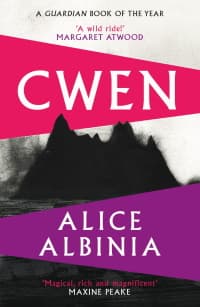
Cwen by Alice Albinia
(Serpent’s Tail, 2021)
Reviewed by Nick Hubble
‘Why is “gynotopia” not listed as a word in either the OED or Merriam-Webster? Answer: Because men have erased such places from our memories.’ This putative pub quiz question, found on the back of a grocery bill along with a list of ideas such as giving every girl five acres at birth and a process of mandatory re-education for men aged seven to seventy-seven, is read out in court as part of the ‘Inquiry into Unfair Female Advantage in the Islands’ which is narrated in Cwen. The ‘Islands’ are an unnamed archipelago off the east coast of Scotland, whose culture has been transformed by a subtle programme of intervention in support of women led by former cabinet minister’s wife, Eva Harcourt-Vane. Her recent disappearance at sea during a storm has brought her social experiment to the attention of the UK media, leading to a frenzy of predictably sensationalist headlines, such as ‘FEMALE TAKEOVER OF ISLAND’S LEADERSHIP’ and ‘FEMALE EDUCATORS CAVORT TOGETHER NAKED’. The loose inquest format of the novel, in which the women Eva has worked with testify as to their collective motivations and achievements, invites readers to ponder whether it is indeed time both for a thoroughgoing overhaul of the patriarchy and to put gynotopia in the dictionary or, indeed, on the map.
While this is a serious question, the novel as a whole is characterised by a pitch-perfect lightness of touch which blends deft social commentary and a gentle infusion of the fantastic with an engaging story that centres on Eva’s granddaughter, Zoe. It is this approach, and the quasi-documentary structure rooted in the courtroom evidence, that allows Cwen to penetrate beneath the alarming capacity of human beings to adhere without question to the ways they believe things have always been done, and so reveal some of the elusive currents of social change that actually underpin what they like to construe as a stable, familiar present. Thus, reported extracts from Eva’s documentary project of interviewing islanders at six-month intervals reveal how life has been transformed for everyone even though the male participants deny that anything has altered for them. We see one such respondent led grudgingly step by step to the realisation that the reason he is spending time with his grandchildren is due to the socio-economic rebalancing of island life that Eva has instigated.
‘Cwen’, as we are informed by the novel’s epigraph, is the old English word for ‘woman, wife, female, ruler of a state’. Here, it is also the name of a small, unmanned, island and the spirit presiding over its Neolithic cairn and nearby spring, who also fulfils the function of chorus in the novel, punctuating the courtroom chapters with reflections on several thousand years of experience. This structure and set-up work to reinforce the idea of a fluid, shore-foraging, island-based history, which is at odds with the idea of human civilisation evolving through male hunting and then the adoption of a hierarchical societies based on the accumulation of agricultural surpluses. Quotations throughout from sources ranging from Tacitus to Gilles Deleuze, which reinforce the association between islands and women, have left me keenly anticipating Alice Albinia’s forthcoming non-fiction book on Britain, The Britannias. Albinia, in a nice metafictional touch, also seems to feature in Cwen as the character Alice.
What distinguishes Cwen, and similarly themed novels of recent years such as Aliya Whiteley’s Skein Island, is that they have moved beyond the battle-of-the-sexes novels of the late twentieth century to consider the more profound question of what life after patriarchy will be like. As Cwen, herself, ruminates, women can live with men, the question is ‘whether they can live together, and beyond themselves, with the things not like them’ such as the rest of the natural world. This delightful, profound and intersectional novel — which includes trans and nonbinary characters among its women — provides all of us island dwellers with some hope in that respect.
Review from BSFA Review 16 - Download your copy here.
